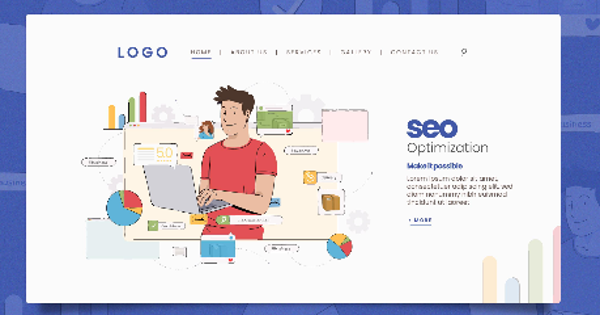5/21/2024
Find yourself searching for free SEO tools for web developers and have no clue where to begin technical SEO, you have come to the right place.
Welcome to our comprehensive guide to Technical SEO, where we will equip you with the knowledge and strategies to outrank your competitors in Google's search results.
In this article, we'll dive deep into the Technical SEO and explore the key factors that will boost your website's visibility, organic traffic, and overall online success.
Key Takeaways
- Definition of Technical SEO
- Importance of Technical SEO
- Key Elements of Technical SEO
- Technical SEO Best Practices
- FAQs on Technical SEO
- Final Takeaway
Understanding Technical SEO

Web Developer doing seo - ilustration - Image by coolvector on Freepi
What is Technical SEO?
Technical SEO can get confusing for web developers but it doesn’t have to be. It refers to the process of optimizing the technical aspects of a website to enhance its search engine visibility and user experience.
Unlike on-page and off-page SEO, which focus on content and backlinks, respectively, Technical SEO concentrates on the behind-the-scenes elements that search engines use to crawl, index, and rank websites
Importance of Technical SEO
Technical SEO is the foundation upon which your website's performance relies. It ensures that search engine bots can easily crawl and understand your content, leading to higher rankings in the search results.
A well-optimized website will also provide a seamless user experience, reducing bounce rates and increasing user engagement
Key Elements of Technical SEO

Person Encoding in Laptop - Pexels - Lukas
Website Speed and Performance
Website speed plays a crucial role in both user experience and search engine rankings. A slow-loading site can lead to frustrated visitors and lower rankings.
To enhance your website's speed, consider the following:
- Optimizing image sizes and formats.
- Enabling browser caching.
- Minifying CSS and JavaScript files.
- Using a content delivery network (CDN).
Improving your website's speed not only benefits your search engine rankings but also enhances user satisfaction, leading to higher conversion rates.
Mobile-Friendly Design

macbook pro beside apple magic mouse - Unsplash - Alvaro Reyes
With the majority of online searches happening on mobile devices, having a mobile-friendly website is imperative. Ensure that your site is responsive and adapts to various screen sizes.
Mobile optimization not only pleases search engines but also caters to the growing mobile user base.
Implementing responsive design, optimizing touch elements, and utilizing mobile-specific features can significantly improve your website's mobile performance and provide a seamless experience for mobile users.
Site Structure and Navigation

person writing on white paper - Unsplash - UX Indonesia
A clear site structure and intuitive navigation are vital for both users and search engines.
Organize your content into logical categories and use descriptive URLs to help search engines understand your website's hierarchy. Implement a breadcrumb trail to aid users in navigating your site effortlessly.
A well-structured website not only helps search engines index your content effectively but also enables users to find what they're looking for quickly, resulting in a positive user experience and increased engagement.
URL Structure
Optimize your URLs by using descriptive, keyword-rich slugs. Avoid using long strings of numbers or irrelevant characters. A clean and concise URL structure makes it easier for search engines to interpret your content and boosts click-through rates.
When crafting URLs, aim for simplicity and relevance, incorporating target keywords when appropriate. This not only helps search engines understand the content of your pages but also improves the visibility and clickability of your URLs in search results.
Schema Markup
Implementing Schema markup provides search engines with additional context about your content. This helps them display rich snippets in the search results, enhancing your website's visibility and attracting more clicks.
Schema markup allows you to highlight specific details such as reviews, ratings, events, recipes, and more, making your content stand out in search results and driving higher click-through rates.
By leveraging Schema markup effectively, you can provide users with valuable information directly on the search engine results page, improving user engagement and clickability.
Technical SEO Best Practices
Conduct Regular Site Audits

Seo Audit White Blocks on Brown Wooden Surface - Pexels - Pixabay
Regularly audit your website to identify technical issues that might hinder search engine crawlers. Use Serpence SESMO to identify and fix errors like broken links, duplicate content, and crawl errors.
By conducting regular site audits, you can proactively address technical issues that may impact your website's visibility and ensure that your website is in compliance with search engine guidelines.
This practice helps maintain a healthy and optimized website that performs well in search engine rankings.
XML Sitemap Optimization
Create and submit an XML sitemap to search engines. This map acts as a guide, ensuring that search engines crawl and index all essential pages of your website. Keep the sitemap updated and free of errors.
By providing search engines with an XML sitemap, you help them discover and index your website's pages more efficiently.
This allows search engines to understand the structure and relevance of your content, leading to improved crawlability and better search engine visibility.
Robots.txt File
Properly configure your robots.txt file to instruct search engine crawlers on which pages to crawl and index and which ones to avoid. This file is essential for preventing sensitive or duplicate content from appearing in search results.
By correctly setting up your robots.txt file, you can control how search engine crawlers interact with your website.
This ensures that only relevant and valuable content is indexed, minimizing the chances of duplicate or low-quality content negatively affecting your search engine rankings.
Canonicalization

a couple of sheep standing on top of a grass covered field - Unsplash - Jørgen Håland
Avoid duplicate content issues by implementing canonical tags. These tags tell search engines which version of a page should be considered the primary source, avoiding content duplication penalties.
When multiple versions of the same content exist, canonical tags help search engines understand the preferred version to index.
This prevents dilution of ranking signals and ensures that the most relevant and authoritative page is displayed in search results, enhancing your website's visibility and organic traffic.
SSL Certificate

black iphone 5 on yellow textile - Unsplash - Franck
Ensure your website is secure by using an SSL certificate. HTTPS is a ranking factor, and a secure website inspires trust among users and search engines.
By implementing HTTPS, you provide a secure and encrypted connection for your website visitors.
This not only improves your search engine rankings but also protects user data, builds trust, and enhances the overall user experience.
Final Takeaway
In conclusion, mastering Technical SEO is vital to outrank your competitors in Google's search results.
By optimizing your website's speed, mobile-friendliness, site structure, and implementing best practices, you can significantly improve your search engine visibility and attract more organic traffic.
Remember, technical SEO is an ongoing process that requires regular audits and updates to keep up with the ever-changing search engine algorithms.
Stay informed about the latest trends and updates, and your website will flourish on the internet.
Frequently Asked Questions
The timeline for seeing results from Technical SEO efforts varies depending on factors such as the competitiveness of your industry, the current state of your website, and the search engine algorithms. In some cases, you may see improvements within a few weeks, while in others, it may take several months to see significant changes.
No, Technical SEO is just one piece of the overall SEO puzzle. While it is crucial for search engine visibility and user experience, it works in conjunction with high-quality content and authoritative backlinks. A well-rounded SEO strategy incorporates all these elements to achieve the best possible results.
Technical SEO can be complex, and it requires a solid understanding of website development and optimization. While there are many resources available to help you learn and implement Technical SEO, hiring a professional SEO agency or specialist can ensure that your website is fully optimized and compliant with best practices.
It is recommended to conduct site audits regularly, at least once every three to six months. Regular audits help identify and address any technical issues that might be affecting your website's performance and search engine rankings. By staying proactive and vigilant, you can maintain an optimized website that delivers exceptional results.
Mobile optimization is a crucial aspect of Technical SEO as mobile devices now account for a significant portion of online searches. By ensuring your website is responsive, loads quickly on mobile devices, and offers an excellent user experience, you can improve your search engine rankings and cater to the growing mobile user base.
Yes, there are several free tools that can help improve your SEO game. Serpence SESMO is an amazing free SEO tool for web developers that helps you with sitemaps, web page inspection, site inspection, and robots inspection. Google Search Console provides valuable insights into your website's performance, crawl errors, and indexing status. While free tools can provide some insights, investing in premium SEO tools and services can offer more comprehensive analysis and actionable recommendations for your website's success.

